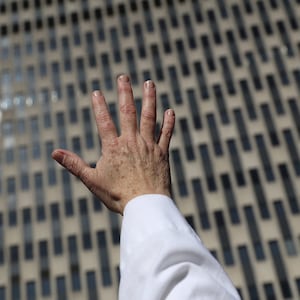The Trump administration’s attempts to implement longstanding policy goals on immigration in the name of fighting the coronavirus pandemic has helped spread the deadly virus to Central America, according to a new report from an international refugee organization provided to The Daily Beast.
Among the findings, a staggering one in five cases of COVID-19 in Guatemala can be traced back to migrants that the United States has deported.
The report from Refugee International, a non-governmental organization that advocates for displaced people, published on Tuesday morning, has found that despite being given a clean bill of health by the U.S. government, would-be asylum seekers and deportees from the United States are increasingly being returned to their countries of origin and testing positive with the coronavirus once they arrive. The organization pins the blame on crowded conditions in American detention centers, the spread of the virus among immigrant communities forced to live and work in cramped environments, and the living conditions for those seeking asylum at the U.S. border—all of which amount to a “public health disaster” in the making.
ADVERTISEMENT
Nearly 20 percent of those returned to Guatemala from the United States and the U.S. southern border have tested positive for the virus since arriving, the report found. Increasing fears of those being forcibly returned has led to the social and economic isolation of deportees in their native countries—some have even faced physical assault from fellow Guatemalans afraid that they have brought the virus with them.
“Policies that address protection needs rather than exacerbate them require humanity, political will, and flexibility to achieve,” concluded the report’s authors, Yael Schacher and Rachel Schmidtke. “Now more than ever, policymakers must ensure that Guatemalans fleeing harm have access to refuge in the United States and Mexico and that Guatemalan returnees have access to safety, healthcare, and economic opportunity.”
Despite those warnings, President Donald Trump on Monday demonstrated that he continues to see access to the immigration and asylum system as a nail in need of a hammer, as the White House announced that the president intended to sign an executive order “extending and expanding” restrictions on both certain visas and the eligibility of asylum seekers to obtain work permits. The order was described to reporters on a background call with a senior administration official as “free[ing] up more jobs for Americans,” but has infuriated both immigrant-rights advocates and economic supporters of increased legal immigration, who have called the moves bad for both public health and the nation’s fragile economy.
“This is not a COVID-19 response or an economic response. It’s the exploitation of a pandemic to institute divisive policies and reshape immigration law,” said Andrea Flores, deputy director of immigration policy for the American Civil Liberties Union, who said that immigrants “are instrumental to our nation’s economic recovery.”
“Putting up a ‘not welcome’ sign for engineers, executives, IT experts, doctors, nurses and other workers won’t help our country, it will hold us back,” said Thomas J. Donohue, CEO of the U.S Chamber of Commerce. “We have long advocated for a rational immigration system that meets the needs of our economy and reflects the values of our country. Today’s proclamation serves neither of those interests.”
There is a straight line to be drawn, Schacher and Schmidtke write in the report, between the conditions that have further spread the virus—both among immigrant communities in the United States and in Central America—and the immigration policies of the Trump administration. Some of the issues predate the virus’ appearance, although public health experts have warned for years that Trump’s “remain in Mexico” policy, for example, was creating a public health nightmare south of the U.S.-Mexico border.
“Deportations and returns carried out in the midst of the COVID-19 pandemic compound these challenges and contribute to the spread of the virus,” write Schacher and Schmidtke, noting that asylum seekers—being almost definitionally poor and lacking in access to medical assistance—are among the most likely to suffer complications from COVID-19 infection. “Deportees from the United States made up nearly 20 percent of the 500 coronavirus cases in Guatemala and, as of early June, deportees continue to test positive for COVID-19 upon arrival in Guatemala despite having clean bill-of-health documents from the United States.”
These risks have been exacerbated, Refugee International found, by the invocation of the Public Health Safety Act in late March, which has allowed U.S. Customs and Border Protection to refuse to accept protection requests for those seeking asylum at the U.S. southern border. Under that order, those seeking asylum can be returned either to Mexico or to their countries of origin without screening, and children at the border have been routinely expelled without being referred to the Department of Health and Human Services’ Office of Refugee Resettlement. Between March and early May, the report found, at least 417 minors were deported from the United States to Guatemala without referral.
“For months, public health experts have made common-sense recommendations to curb the spread of COVID-19: Release people held in ICE and CBP detention; suspend civil immigration enforcement; and provide access to testing and treatment for everyone who needs it, regardless of immigration status,” said Flores. “Instead, while ignoring these recommendations, the Trump administration has banned asylum seekers at the border, green card applicants, foreign students, and now even more immigrants... Congress should immediately investigate the true purpose—and ramifications—of these Stephen Miller bans.”







